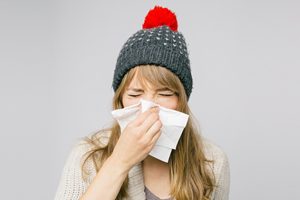
If you suffered from spring and fall allergies this year, there's a good chance you'll suffer from winter allergies too. According to WebMD, 55 percent of the U.S. population tests positive for one or more allergens, and we spend 90 percent of our lives indoors. This alone indicates that allergy sufferers shouldn't ignore winter allergies. They need to prepare to fight them.
Dr. Kathleen Sheerin from the Atlanta Allergy and Asthma Clinic says that because we spend so much time indoors, we're more likely to be affected by allergies, particularly those from pets.
"If you spend more time inside," she said, "then you're going to have more exposure to your pets during the winter season."
Along with pet dander, people can also suffer from mold, dust and dust mites. While there are different ways to treat these allergies, the symptoms are similar.
"You can have itchy eyes, itchy throat, itchy nose, a lot of people do this – we call that the allergic salute. Runny sneezy, congestion and those are the basic allergy symptoms," said Sheerin.
To treat winter allergies, first figure out what you're allergic to by completing an allergy test at your local doctor's office. If you're allergic to mold, purchase a dehumidifier. If dust is bothering you, use allergy-free pillow and mattress covers and dust mite-free pillows. You can also opt for a dust-free pillow. Many are washable.
For more information on proper allergy management techniques and allergy control products, visit Allergy Be Gone today.









